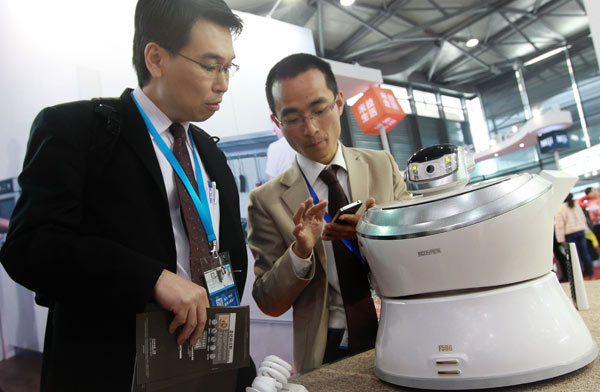 |
|
A salesman, right, shows a visitor how to operate an air purifier using his cellphone at an expo in Shanghai. Pei Xin / Xinhua |
With smog plaguing large areas of China, especially Beijing and Shanghai, air purifiers and masks are joining the list of top gifts that Chinese bring home from the US for family members and friends.
The list already included luxury goods, health products and milk powder.
"I have bought 15 masks and plan to buy an air purifier to bring back to my family at the end of this month," said Bing, a Chinese PhD student studying mechanical engineering in New York, who did not give her full name.
She will travel back to her hometown of Shijiazhuang in Hebei province, one of the cities most severely affected by smog.
"I have read news reports about the smoggy weather, and it occurred to me that maybe I should bring back an air purifier, since the quality of these products in the US is generally more trusted," Bing added. "I asked my parents if the situation was bad and if they needed one and they think it's a great idea."
Bing said some of her Chinese friends in the US are buying masks online and asked her if she wanted some to take back to China. "I said, ‘of course'."
Yang Yang, a 23-year-old overseas student studying in the United States, bought an air purifier there last year and brought it home to Beijing as a New Year's gift for his family.
"The purifier I got from Amazon was about half the price of some of those available in China," he said. "In addition, I find that the quality of the foreign products is more reliable.
"Many of my friends from China have bought purifiers online in the US, as the prices are very reasonable there," he added. However, Yang had to pay customs tariffs when he returned home in April.
In China, the US embassy ordered 2,000 air purifiers for its employees in the country last month from Blueair, a Swedish manufacturer.
Zhang Ling, a sales agent for the firm, said customs tariffs are not the only problem confronting buyers.
"Customers have to use a voltage converter, which will result in harm to a machine with unstable voltage," he said. "Post-sales maintenance and warranty is also a problem."
Allen Tang, sales manager at E-World Travels and Tours in New York, said travelers from China have asked him in recent months where they can buy masks, in addition to health products and luxury goods.
"Many say how the air conditioning here in New York is so much better (than where they come from) and some buy dozens of masks to take back to China. They prefer American brands such as 3M."
Mui, who works at a pharmacy in New York's Chinatown and would only give her last name, said: "It is interesting that mainland customers prefer local brands like 3M. We actually imported these 3M masks from China."
A report published by global market research and consulting company TechSci Research in July said the market for air purifiers in China is expected to increase at a compound annual growth rate of around 34 percent during the next five years.
The pollution problem is resulting in business for companies outside China, with Oransi, an air purifier manufacturer based in Austin in the US state of Texas, deciding in the autumn to join the flow.
CEO and founder Peter Mann said on his blog that the company's first products are on their way to China. The firm insists on highlighting the fact that its products are made in the US, to gain consumers' trust.
Zhang, from Blueair, said the company has seen huge sales in China recently.
He said purifiers sell well from November to March, as the worst pollution occurs during the winter.
The company sold purifiers worth more than 1.5 million yuan ($245,000) last year, with half of the sales made in the winter, he said. "Most of the customers are senior citizens, pregnant women and young people.
"Many foreign households have purifiers, as some occupants are allergic to pollen or have respiratory diseases, but most Chinese households have them simply to ward off the smog."
Zhang predicts a much better sales performance in 2014, as more people have become aware of the hazards posed by pollution. "The current problem is a lack of supply, rather than a lack of customers," he said.
Herman Pihltrad, president of Blueair, told China Daily the company can see large increases in order inquiries in the first and second quarters in Beijing, and more recently inquiries have risen in Shanghai.
The difference in price for masks in China and the US is not significant, but it is for air purifiers.
The cheapest model from Blueair, the Blueair 203, costs 3,590 yuan ($591) from Torana Clean Air, Blueair's official seller in Beijing, while it sells for $329 on the Best Buy and Amazon websites in the US.
The order placed for air purifiers by the US embassy was handled by the Swedish company's American supplier, and the unit price was not disclosed.
To show that it is cheaper to buy from US suppliers, some of them have been posting the price difference for various models in both countries.
However, there are problems in ordering from the US, including customs charges, the validity of warranties, and voltage differences. An air purifier sent from the US to China is subject to a 25 percent tax rate at customs, according to dutycalculator.com.
"Problems are likely," Pihltrad said. "All countries have different product specifications, and they are made for the conditions in a specific market. Therefore, a warranty is void if used in another country."
